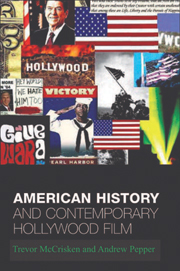Book contents
- Frontmatter
- Contents
- Acknowledgements
- Preface
- Introduction
- 1 Lessons from Hollywood's American Revolution
- 2 Rattling the chains of history: Steven Spielberg's Amistad and ‘telling everyone's story’
- 3 Hollywood's Civil War dilemma: to imagine or unravel the nation?
- 4 Saving the Good War: Hollywood and World War II in the post-Cold War world
- 5 Oliver Stone and the decade of trauma
- 6 From Civil Rights to Black Nationalism: Hollywood v. black America?
- 7 Hollywood's post-Cold War history: the ‘righteousness’ of American interventionism
- Select Bibliography
- Index
Introduction
Published online by Cambridge University Press: 05 August 2013
- Frontmatter
- Contents
- Acknowledgements
- Preface
- Introduction
- 1 Lessons from Hollywood's American Revolution
- 2 Rattling the chains of history: Steven Spielberg's Amistad and ‘telling everyone's story’
- 3 Hollywood's Civil War dilemma: to imagine or unravel the nation?
- 4 Saving the Good War: Hollywood and World War II in the post-Cold War world
- 5 Oliver Stone and the decade of trauma
- 6 From Civil Rights to Black Nationalism: Hollywood v. black America?
- 7 Hollywood's post-Cold War history: the ‘righteousness’ of American interventionism
- Select Bibliography
- Index
Summary
Hollywood has not typically enjoyed a good reputation as a purveyor of history. American filmmakers are frequently condemned for rewriting history, for providing an ‘arrogant distortion of the historical record’ or even for the ‘rape of US history’. Films made about particular episodes or events from America's past are often accused of providing a disturbingly falsified picture of ‘what really happened’; they consistently privilege action and drama over historical accuracy; they simplify the complexities and contingencies of the past by attempting to impose clear-cut resolutions on the ‘mess’ of history; and their aim is to entertain audiences and make money for their producers rather than to represent the past in a fresh light or encourage audiences to critically reflect on this past in new ways. As Robert Brent Toplin puts it, critics of historical feature films would seem to hold the unshakeable view that: ‘To learn about history, go to a book, not to a movie’.
Since at least the 1970s, however, many historians have been increasingly willing to recognise the value of Hollywood films as both tools for teaching and as resources for helping to interpret American history. A small library of books on the subject of historical films and regular articles and forums in major journals such as American Historical Review and the Journal of American History attest to the seriousness with which many historians now treat feature films that focus on historical events or characters.
- Type
- Chapter
- Information
- American History and Contemporary Hollywood Film , pp. 1 - 14Publisher: Edinburgh University PressPrint publication year: 2005



